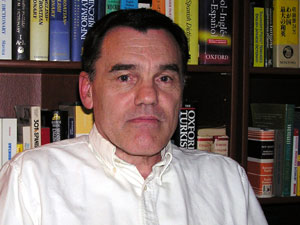Audio
Photos
Respond to this story
| |||||||||||||||||||||
Abu Ghraib interrogator tells his story
October 11, 2004
 |
| Roger Brokaw was a military intelligence interrogator at Abu Ghraib prison in Iraq. (MPR Photo/Lorna Benson) |
St. Paul, Minn. — Roger Brokaw didn't witness the incidents documented in the now-infamous photographs. But the Army reservist saw other situations in Iraq that still haunt him. For six months last year, Brokaw worked at Abu Ghraib prison as a military intelligence interrogator.
"Your job is to break down the resistance of the person being interrogated, so he will give you the information that you're seeking," Brokaw says.
Each day Brokaw would get two or three new Iraqi prisoners to question, but the assignment was always the same.
"It was usually, first question, 'Where's Saddam?' you know. They wanted to catch Saddam so bad and then you know it fell down to terrorist organizations and where the weapons are hidden and so on," says Brokaw.
Almost immediately Brokaw had a dilemma. Most of the prisoners appeared to him to be average Iraqis picked up for petty crimes or for being in the wrong place at the wrong time - not terrorists. No matter how much he questioned them, they didn't seem to have any useful information. Brokaw believed them, but he says his superiors didn't. Suicide bombings were becoming an everyday occurrence in Iraq and U.S. military leaders wanted interrogators at Abu Ghraib to find who was responsible.
 | |||
"A lot of pressure. Oh definitely," says Brokaw. "Our fellow soldiers are dying. We've got to prevent this you know. So let's just go to the nth degree to get this information to prevent people from getting killed."
Brokaw says his bosses didn't define "the nth degree". But it was clear that they wanted him to push detainees much harder to get information.
"I had a couple people tell me that I was too soft on the prisoners and that I should toughen up my technique. But you know you get a lot of bad information when you torture people because they'll say anything they can to get away from the pains," he says.
Brokaw ignored the suggestions - confident in his 27 years of military experience and his training in prisoner rules under the Geneva Convention. But he believes many of his colleagues gave in to the pressure. Brokaw recalls meeting one Iraqi prisoner who had obviously been roughed up before he even got to his interrogation.
Says Brokaw, "The prisoner was very skittish, very uptight, 'cause every time I'd just adjust myself in my seat he'd flinch. And he said, 'You're gonna hit me.' And I told him 'No. I'm not going to hit you.' I says, 'Why do you say that?' And he said, 'Well the other guy was beatin' me.' And then he opened his shirt and had a bunch of bruises all over his torso."
Brokaw asked the prisoner to identify the person who beat him. He pointed to a man dressed in civilian clothes. That meant he was either contracted by the U.S. government or he worked for the FBI or the CIA. Brokaw reported the incident to his superiors.
"Well, first I told the sergeant there and he just kind of smiled and said, 'Oh, you know Iraqis are all liars,'" says Brokaw. "And then when I reported it to the warrant officer, he just kind of, just 'Oh, yeah, yeah, we'll look into it' and continued on with what he was doing and never did anything."
On another occasion, Brokaw says he witnessed a military police officer abusing a kid at the prison who didn't raise his arms properly during a search.
|
"I had a couple people tell me that I was too soft on the prisoners and that I should toughen up my technique. But you know, you get a lot of bad information when you torture people."
- Roger Brokaw |
Says Brokaw, "He had his hands maybe a couple inches below horizontal and the M.P. just went berserk on him and just flipped him on the ground and smashed his head in the ground in the dirt and was screaming all kinds of epithets at him and he did this right in front of me. I mean I was like three feet away when he was doing this and I said 'Hey, what did he do?' 'He didn't put his hands up like he was supposed to.' And I says, 'I saw him put his hands up.' 'Yeah, it wasn't high enough.' So I reported to a sergeant in my office and he said, 'Oh, it's an M.P. problem. Let them deal with it.'"
Brokaw says he was frustrated, but there wasn't much more he could do.
"There was just a general atmosphere of condoning things, of just a lack of oversight," says Brokaw. "In spite of the fact that different rules and regulations were coming down telling us we couldn't do this and we couldn't do that, but it was like it was all lip service. I mean you could just kind of feel it. There just wasn't something right."
About a week before Brokaw departed Iraq, he says he got a particularly odd assignment. It began during a Red Cross visit. Brokaw's superiors didn't have enough military police to guard some prisoners being held in an unoccupied wing of the prison. At the last minute they recruited Brokaw and several of his interrogator colleagues.
"They had five Iraqi men, one per cell and they had hoods on them, the bags over their heads and they had tie binds on their hands behind them and they were making them sit in the middle of the floor. You know, for the six hours they wanted them to sit in the middle of that floor, you know? And so we were sitting there and it was running through my mind, 'Why are we doing this? Why are we doing this?,'" says Brokaw.
"Well afterwards, after my shift was over, I was outside of our billeting area and Colonel Pappas and Lt. Colonel Jordan and two or three other officers were in a gaggle there talking and I overheard them talking about how they you know, they says well we'll keep these guys hidden until they leave, til the Red Cross leaves you know. So I figured, 'Oh, they're hiding them from the Red Cross,'" says Brokaw.
"And then some woman, I think it might have been Captain Wood, but I'm not sure, she was saying, 'Well, won't they wonder where they're at if they see their name on the list?,'" says Brokaw. "They said, 'Well these guys aren't on a list. These are nobodies. They're ghosts' or something like that."
Brokaw didn't report the incident.
 | |||
"I didn't know who to report it to," says Brokaw. "Here's my superiors. You know, who do I report it to?"
Army spokeswoman Pamela Hart says she can't verify the exact conversation Brokaw overheard, but she says the Army does confirm that those officers were involved in the so-called "ghost prisoner" scandal.
"Well the statements you've gotten from the former interrogator were completely in line with what the Army has found," says Hart. "We indeed separated detainees and did not have them made public to the International Committee of the Red Cross."
Hart says the Army has no problem with Brokaw talking about his time at Abu Ghraib because he is retired from the military and he was not part of the investigation. Brokaw however says he has met others who are annoyed that he's speaking out.
"Yeah, I've had a couple people tell me, 'Well people shouldn't know about this. We've gotta keep this quiet,'" Brokaw says.
When Brokaw asks them why anyone should remain quiet, he says they usually issue the same reply.
"Well, cause you know you talk about this and it's gonna make our troops look bad and they're going to kill more out there."
Not long ago concerns like that would have stopped Brokaw in his tracks. But not anymore. The reason has a lot to do with what happened to his wife while he was serving in Iraq. She was struck by a car while crossing University Avenue and spent nine days in a coma. Brokaw rushed back to the Twin Cities, but she died the day before he arrived. He says the experience changed him and he no longer worries about what people think. Brokaw would still like to share his stories and concerns with the military. But he probably won't get the chance. The Army says it has finished its investigation into what went on at Abu Ghraib and all that's left is to figure out punishments for those who took part in the abuse scandal.
|
News Headlines
|
Related Subjects
|

